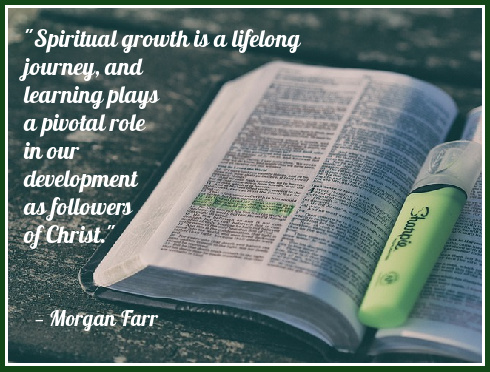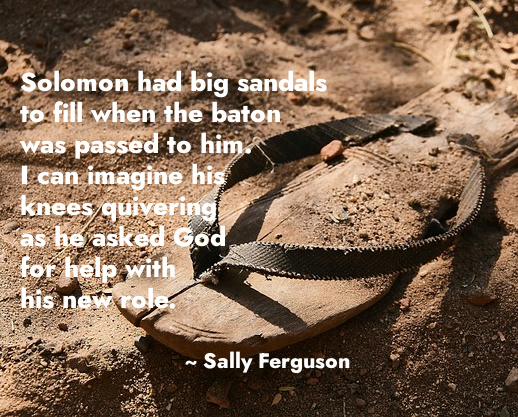It's my birthday today, and I've been thinking a lot about finishing my earthly race well. Actually, I started getting serious about "finishing well" shortly after I received my diagnosis with Multiple Myeloma in 2019. A diagnosis can do that!
In this Wisdom UPGRADE, I want to share some things I've learned as I've thought and meditated on this concept of finishing the final season of life.
We need a blueprint, a well-defined pattern to observe and follow, in order to finish well.
The Bible teaches us principles about finishing well in the final season of life. I see it as a pattern.
- There are "Principled People" in the Bible who illustrate powerful truths. They are the who in this article—biblical characters like Joseph and Paul, and especially Jesus.
- We also need a "Powerful Perspective" as we consider why it's so important.
- Then, through "Productive Preparation," we learn how to finish well.
- And it helps to have a "Practical Picture"—what does it look like to finish well today?
Let's look at each of these.
1. Principled People: WHO in the Bible Illustrates Finishing Well?
So many biblical characters did not finish well. We think of King Saul, Jezebel, King Solomon, Judas, Ananias and Sapphira, and others). But many, though not perfect, did finish well, holding God and His Word paramount in their lives.
Here are just a few examples.
Joseph finished well. In spite of all life threw at him—his brothers' conspiracy and others' abuse—Joseph finished his race in spiritual strength. His family saw firsthand how he had served both God and Pharaoh, trusting the Lord with his whole heart through tough, scary times. Throughout his lifetime, Joseph used the wisdom God gave him, and stood firm and courageous against sexual immorality.
In the last seasons of his life, Joseph wisely provided for his family in a foreign land (Genesis 50:19-21), and in faith, he gave instructions about taking his bones home for burial in the Promised Land (Genesis 50:22-25; Hebrews 11:22).
Joseph lived well and he finished well, giving us an example of courageous commitment and wise preparation.
King David finished well. Even though the "man after God's own heart" had great courage and successes, there are signs that he never recovered from his moral failures, and his family was impacted by the consequences of his sins. His firstborn, Amnon, raped his half-sister, Tamar; and then Tamar's brother, Absalom, killed Amnon. Later Absalom led a conspiracy to take over David's throne. The family devastation continued into Solomon's reign.
So David was not perfect. He confessed his sin and was forgiven—but he didn't act forgiven. In his final years he was hindered by regrets.
Yet Acts 13:36 says David finished well. He "served God's purpose in his own generation," and that is a lesson for all of us—to serve God's purposes in OUR generation. It's worth our time to discover God's purposes . . . ask for wisdom (James 1:5).
The Apostle Paul finished well. In 2 Timothy 4:7, he said, "I have fought the good fight, I have finished the race, I have kept the faith."
We say Paul finished well because of all he endured in completing the will of God in his life (2 Corinthians 11:23-28). He suffered three shipwrecks, was imprisoned, flogged, beaten, and stoned. He knew cold, sleeplessness, hunger, and thirst. He was disdained and assaulted by Jews, Gentiles, and false Christians.
Paul trusted God's sovereign love and perfect providence and love (Romans 8:28, 36-37) until his death.
Paul teaches believers how to suffer well in order to finish well.
Jesus, our Savior, finished well. Jesus, said in John 17:4, "God, I have glorified you on the earth. I have finished the work which you have given me to do."
That doesn't mean He finished all the work possible to do. No, Jesus left many things unfinished—for now. (He's coming back, remember.)
But our Lord, in His first advent, finished all the work the Father gave Him to do AT THAT TIME.
- He followed the Father's blueprint, staying closely attuned to His will (Luke 22:42).
- He was sent to "seek and save that which is lost" and provide atonement for all who would put their trust in Him (Luke 19:10; Romans 3:23-25).
- Jesus completed His work on the cross—not turning away from it (Hebrews 12:2-3).
- He rightly said of His sacrifice for sinner, "it is finished" (John 19:30).
- And Jesus discipled and commissioned those who would share the good news of salvation after He returned to heaven (Matthew 28:16-20).
Finishing well, for Jesus, required commitment, faithfulness, obedience, and vigilance—the same qualities we need to finish well.
2. Powerful Perspective: WHY is it important to finish well?
It's important for at least three reasons.
First: It's important to Jesus that we finish well.
Christians in earlier generations made much of the parable Jesus taught in Matthew 25:14-30, the parable of the talents. Two faithful servants used what their master had given them (bags of gold) to increase his wealth, but one foolish servant failed to even invest it. The two faithful servants heard, "Well done, good and faithful servant" (Matthew 25:21, 23).
Jesus shared that parable to help His disciples undertand not everyone will finish well, and He WANTED them to finish well.
"Well done" are the words every committed Christian longs to hear from Jesus someday in heaven. To hear those words, a person must be a genuine believer (Hebrews 11:6) and commit to faithfully serve and obey Jesus as Lord (Luke 6:46).
Martin R. De Haan II said, "Finishing well is the right way for a Christian to close the final chapter of life's book. It testifies to the reality of our faith. It leaves for those who remain a legacy of inspiring memories."
As I'm writing the final chapters of my life, I want to finish well, with purpose, wisdom, strength, and joy.
Second: What we do today matters in eternity, so we need to keep that in mind.
Years ago, a friend, Ken Nichols, shared an acronym that has helped me keep a proper perspective on life. To be fully ALIVE, he said, means "Always Living In View of Eternity." As wonderful as this life can be, we're not to just live for today. We were made for eternity.
J.D. Greear says that in Luke 12 there are three ways to live in light of eternity:
In other words, be alert to God's will and active in your task, remembering that Jesus could return at any moment—and you will want to be found faithful.
Third, there are crowns to be won!
The New Testament mentions five crowns:
3. Productive Preparation: HOW do we go about finishing well?
So we know the who and the why of finishing well . . . but how?
A key word that kept popping out as I studied how to finish well was "prepare." God doesn't want us to be lazy or thoughtless concerning spiritual maturity and obedience.
I love the proverb about the ant who stored up provisions in summer and harvest (Proverbs 6:6-11). Solomon addressed the person who foolishly did not prepare in life, saying, "How long will you lie there, you sluggard?"
The Lord wants us to prepare wisely to be a productive servant . . . every single day.
(That doesn't mean we can't rest, as long as our final season doesn't become one big rest stop! And we can vacation, but we must never vacate our position as an ambassador of Christ, wherever we are!)
Preparing to finishing well is a heart attitude and a mindset.
Dr. Paul Chappell wrote about being "finish ready"—being "ever-ready" for that moment when "our ship will leave the harbor" for heaven.
Preparation can take many shapes. For me, it involves watchfulness, being a person who remembers to "love His appearing" (2 Timothy 4:8b). It means watching and eagerly waiting for my Lord's immenent return.
It also means submission to Jesus as Lord, the kind of humble surrender that leads to obedience and service. We cannot call Jesus "Lord" (ruler over us) while refusing to do what He says (Luke 6:46).
It means spiritual growth—not being content with where we are spiritually. It means falling more in love with God's Word, increasing in our love and devotion toward Him, growing in grace and wisdom, etc. Essentially, it's upgrading all the "basics" of the Spirit-led Christian life.
We have to persevere in these things, and when we do, there is great reward. The writer of Hebrews said, "You need to persevere so that when you have done the will of God, you will receive what he has promised. For 'In just a little while, he who is coming will come and will not delay'" (Hebrews 10:36-37).
4. Practical Picture: WHAT does it look like to finish well?
Althought the goals are the same—to love and honor God and obey Him—finishing well will probably look different in individuals.
For me, it's writing the book that is in my heart, preparing my family for when I go to heaven, and continuing to reach out to my neighbors.
For you, finishing well might look like this:
- Cultivating you Marriage to the glory of God—drawing closer to your spouse in every way.
- Considering what kind of legacy you're leaving your children and grandchildren—and if that doesn't look like what you want, what can you do to change it?
- Working on difficult relationships . . . like finally talking to that person you offended with a spirit of reconciliation—or to the person who offended you, with a spirit of forgiveness.
- Getting finances in order so your family won't be saddled with debt and so you can invest in a ministry.
- Giving more of your time and resources to people and ministries instead of buying more stuff.
- Finishing a beloved project, maybe something powerful to help the needy in your community.
- Serving in church in a more impactful way, remembering we never "retire" from all Christian service.
- Going on a ministry trip while you are still physically able to serve.
- Knowing you are ready to enter eternity when you lie on your deathbed
This is more than a bucket list. It's a Prepare to Finish Well list. And we all need to make one and take some productive action every day.
A suggested prayer:
"Father God, please help me finish the work You've given me, and help me finish it well. Show me how to live in light of eternity, all for Your glory and the praise of Your name." Because of Jesus, Amen.
What does finishing well look like in your life, your circumstances? How can you prepare better to finish well?
Dawn Wilson, founder and President of Heart Choices Today, is a speaker and author,  and the creator the blog, Upgrade with Dawn. She is a contracted researcher/reviewer for women's teacher and revivalist, Nancy DeMoss Wolgemuth at Revive Our Hearts, and is a regular columnist at Crosswalk.com. She and her husband Bob live in sunny Southern California, and Dawn has traveled with Him in Pacesetter Global Outreach. They have two grown, married sons, three granddaughters and a rascally maltipoo, Roscoe
and the creator the blog, Upgrade with Dawn. She is a contracted researcher/reviewer for women's teacher and revivalist, Nancy DeMoss Wolgemuth at Revive Our Hearts, and is a regular columnist at Crosswalk.com. She and her husband Bob live in sunny Southern California, and Dawn has traveled with Him in Pacesetter Global Outreach. They have two grown, married sons, three granddaughters and a rascally maltipoo, Roscoe
Graphic adapted, courtesy of Silvia at Pixabay.
 "Does that title question seem silly? After all, God knows everything," Kathy says.
"Does that title question seem silly? After all, God knows everything," Kathy says. books and speaking in 9 foreign countries and over 30 US States. Kathy’s two books (co-written with her
books and speaking in 9 foreign countries and over 30 US States. Kathy’s two books (co-written with her  husband, Larry) about God’s questions are: God’s Intriguing Questions; 60 New Testament Devotions Revealing Jesus’s Nature; and God’s Intriguing Questions: 40 Old Testament Devotions Revealing God’s Nature. Her other books include women’s Bible studies, Bible commentaries, compiled books, and Christian Living books. Her memoir about overcoming being an abusive mom is No More Anger: Hope for an Out-of-Control Mom. Kathy and her husband, Larry, of more than 50 years, are parents, grandparents, lay counselors, and live in Boise, Idaho. Visit her at www.KathyCollardMiller.com.
husband, Larry) about God’s questions are: God’s Intriguing Questions; 60 New Testament Devotions Revealing Jesus’s Nature; and God’s Intriguing Questions: 40 Old Testament Devotions Revealing God’s Nature. Her other books include women’s Bible studies, Bible commentaries, compiled books, and Christian Living books. Her memoir about overcoming being an abusive mom is No More Anger: Hope for an Out-of-Control Mom. Kathy and her husband, Larry, of more than 50 years, are parents, grandparents, lay counselors, and live in Boise, Idaho. Visit her at www.KathyCollardMiller.com. 3 Comments → Posted on
3 Comments → Posted on  Tuesday, January 9, 2024 at 11:00AM
Tuesday, January 9, 2024 at 11:00AM  Examining God's Questions,
Examining God's Questions,  God's Questions,
God's Questions,  Kathy Collard Miller,
Kathy Collard Miller,  Questions,
Questions,  Questions from God,
Questions from God,  Questions from Jesus,
Questions from Jesus,  Upgrade with Dawn Upgrade Your Life
Upgrade with Dawn Upgrade Your Life  Biblical Discernment,
Biblical Discernment,  Wisdom
Wisdom 













